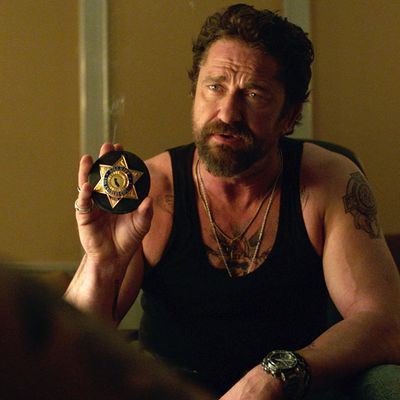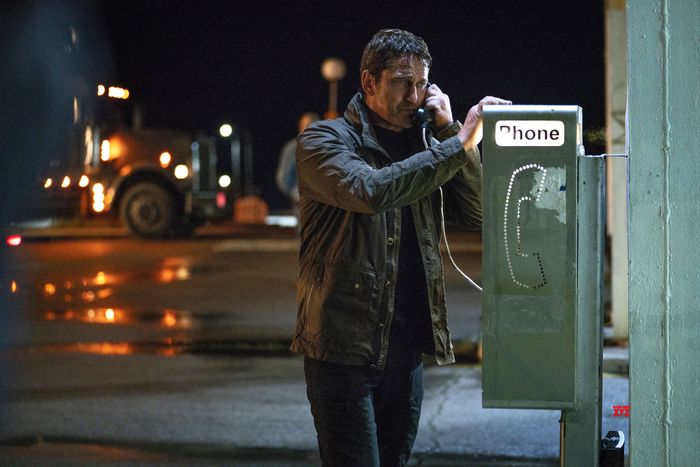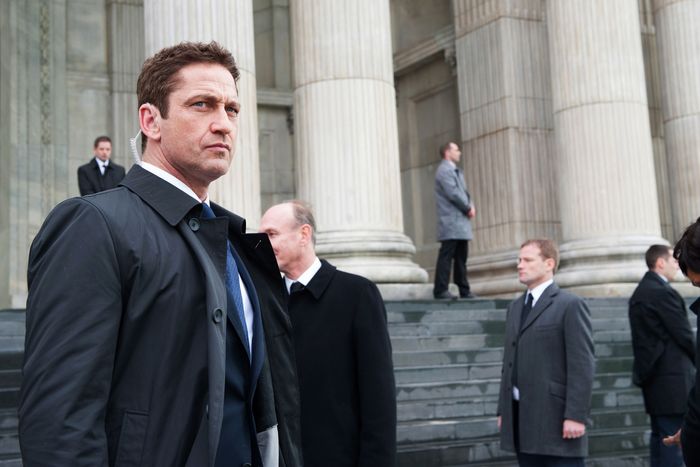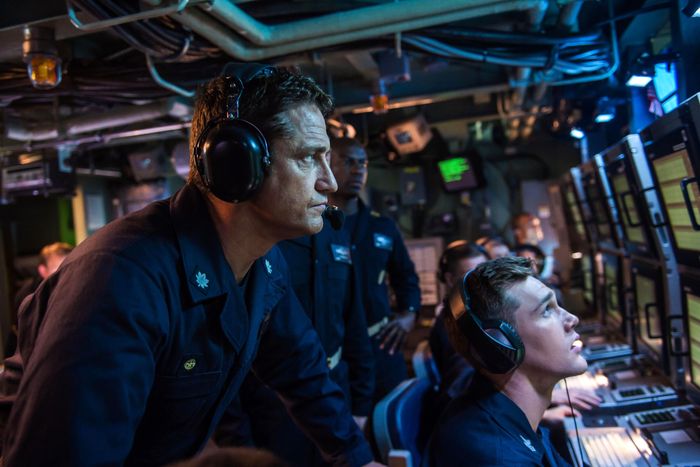
Last month, over the course of about a week, I variously described Gerard Butler to three different people as “the poor man’s Liam Neeson,” “the poor man’s Bruce Willis,” and “the poor man’s Harrison Ford.” I was mostly joking at the time, but after watching his latest, Angel Has Fallen, I’m starting to think that maybe all these descriptions were correct. Gerard Butler feels — and I mean this in the best possible way — like he has been assembled from the used parts of other movie stars. He is an action star for the age of the declining action star, and sometimes I could swear that he is almost single-handedly keeping a very specific type of movie alive.
Angel Has Fallen is the third entry in a franchise in which Butler’s heroic Secret Service agent, Mike Banning, regularly finds himself in apocalyptic situations where he is the only person standing between the president of the United States and certain death. In 2013’s Olympus Has Fallen, a rogue North Korean force seizes the White House after strafing half of downtown Washington, D.C., and Banning has to free the president from his captors while also trying to stop all of America’s nukes from exploding in their silos. In 2016’s London Has Fallen, a Pakistani arms dealer avenges his family by laying waste to the English capital and murdering a bunch of Western leaders during an international gathering, and Banning has to escape with the president. In Angel, a sinister military contractor, working secretly with people high up in the U.S. government, attempts to kill the president, puts him in a coma, and then frames the attack on Banning, who then has to both clear his name and get to the president before the bad guys can finish the job. (I’m assuming that a lower budget is the reason why no major cities are destroyed this time around.) While the previous films in the series played like variations on Die Hard, this latest one plays like a variation on The Fugitive, with several pit stops along the way into John Woo’s Hard Target and Michael Mann’s Heat.
There’s some emotional and narrative continuity between the entries — our hero and his wife (played by Radha Mitchell in the first two movies, and Piper Perabo in the third*), now have a child, after she was pregnant in the last movie; the current president, played by Morgan Freeman, was the Speaker of the House in the first entry and vice-president in the second — but the Has Fallen series mostly unfolds the way action sequels used to. It doesn’t require any real investment from the viewer. You don’t need to have seen or remember any of the previous installments to enjoy the new one. (In fact, it’s probably better if you don’t.) And while the films are of varying quality, Butler’s rough charisma is the glue that holds them together. You feel at ease around him. He’s got a weathered face, with kind eyes, a bruiser’s nose, and a lopsided way of talking that lends him a certain macho modesty — somewhere between the gritted-teeth reticence of Clint Eastwood and the motor-mouth charm of Mel Gibson back when people liked Mel Gibson. You know he’ll scream like a motherfucker when the situation calls for it, but until then, he’s an amiable, aw-shucks dude.
This all makes him somewhat antithetical to most of our ideas about movie stars nowadays. He’s not a superhero, for starters. He’s not absurdly ripped in the way The Rock is, nor does he possess seemingly supernatural fighting abilities, à la Jason Statham or, say, Tony Jaa. He has some of the qualities of late-period Keanu Reeves, but Reeves, who is five years older than Butler, has achieved another level of grace entirely with the gorgeous, otherworldly John Wick movies. Gerard Butler is, in a word, accessible. He is not a golden god — even if he did once literally play a golden god in Gods of Egypt.
Speaking of golden gods, it’s worth noting that the part that really put Butler on the map was his shoutily heroic star turn as King Leonidas of Sparta in Zack Snyder’s 2006 Battle of Thermopylae epic, 300. Back then, of course, Butler was young and beautiful and glistening, as Snyder’s filters and speed ramps and hyper-processed, comic-book flourishes turned that film’s cast into mythic, impossible figures. But even there, something stood out about this actor. He bit into his part with such snarly, spittle-flecked abandon that it actually achieved a tongue-in-cheek quality.
Maybe that’s one reason why 300 fueled a thousand memes right at the dawn of the social-media era, most of them featuring Butler in mid-shout, wide-eyed and covered in blood. Despite the fact that Leonidas was braver and buffer than any of us, you could still sort of place yourself in his sandals as he bellowed, “This! Is! Sparta!” or “Tonight! We Dine! In Hell!” (It was all so perfect that making the meme your own barely required any wit. You could just add, “Tomorrow, I’m thinking Arby’s!” to Gerard Butler’s frozen shriek about dining in hell and you were off to the races.) Butler is so good in 300 that, despite not liking the movie very much, I keep wishing he’d work with Zack Snyder again; he might be the ideal actor to unlock that director’s frantically artificial, self-aware style.
To be fair, Gerard Butler — who, interestingly, started his career as a lawyer — has given some terrific performances over the years, whether as Ralph Fiennes’s snarly Volscian foil, Aufidius, in 2011’s Coriolanus (which mined a similar burst-vein rage as 300, despite being an extremely different movie) or as a gone-to-seed Los Angeles cop in last year’s crime epic Den of Thieves (which otherwise played like Heat reenacted by trap muscles). But for many years, he seemed like a star-in-waiting, searching for a niche. He was a respectable Phantom of the Opera in Joel Schumacher’s out-of-control 2004 adaptation of Andrew Lloyd Weber’s musical, but the over-baked movie went nowhere. (If that had worked out, he might have become the poor man’s Hugh Jackman, or maybe Hugh Jackman would have had to settle for being the poor man’s Gerard Butler.) After the success of 300, Butler appeared in several not-great romantic comedies that nevertheless made fine use of his rough-hewn affability. You just kept pulling for the guy.
In recent years, however, Butler appears to have found his level with a certain type of throwaway, mid-budget, turn-your-brain-off action movie that American studios, in their desperate hunt for soap-opera-like franchises that can go on forever, don’t seem to make anymore. (Even the James Bond series has started to take itself very seriously, with various vendettas and traumas and brooding through lines playing out from film to film to film.) Mark Wahlberg was headed in this direction, but now seems more interested in doing tales of “true-life” heroism.
The only other major stars I can think of who are doing this type of picture are Neeson, who has used his age to carve out a specific dadsploitation niche for himself, and Denzel Washington, whose Equalizer movies (both of which were directed by Antoine Fuqua, who also made Olympus Has Fallen) traffic in the same kind of ostensibly-realistic-but-actually-quite-ridiculous action theatrics as Butler’s Banning movies. But in Washington’s case, you sense one of our great actors doing a paycheck gig, so he can then go and do another Fences, or The Iceman Cometh onstage; Butler, by contrast, looks like he’d be perfectly happy making Has Fallens until the end of time.
It’s not just the Has Fallen series, however, that make Butler such a throwback. Late last year he starred in Hunter Killer, a somewhat ridiculous but genuinely tense and entertaining submarine picture that felt like it had emerged from a time capsule. (The film had in fact been shot in 2016 and languished on a shelf for a couple of years, but it felt a lot older.) In it, he played a working-class sub captain who had to navigate his vessel through treacherous, mine-strewn waters to save the Russian president from a coup attempt and stop World War III from happening. That movie, too, felt like it was assembled from spare parts of older, better movies: a Crimson Tide here, an Under Siege there, an Air Force One there. But dammit, the mix worked. I’ve probably already rewatched it a few times, in bits and pieces.
But I’m pretty sure Gerard Butler could have escaped the wreckage even if the movie had been a dud. In 2017, he starred in Geostorm, a beyond-stupid disaster flick about the Earth being seized by cataclysmic weather events after a futuristic satellite system for combatting climate-change-induced superstorms goes haywire. (He played, somewhat unconvincingly, the genius scientist who had developed the aforementioned space system.) A troubled production that had undergone multiple reshoots, Geostorm was sold in advance as a kind of camp, crap catastrophe. If you squinted, you could sort of see the picture it wanted to be: another throwback, this time to the era of expansive, rousing Emmerichian-Bruckheimerian disaster flicks in which the world came together to combat a seemingly unstoppable calamity. And there Gerard Butler was, in the middle of it all, taking everything perfectly in stride, earnest and yet somehow also in on the joke.
Let me be perfectly clear: Geostorm is a terrible film. But let me also come clean: During one climactic scene when it seemed like Gerard Butler was going to die out in space so he could save humanity (à la Bruce Willis in Armageddon), I teared up a little. For a brief instant, I wept not just for a world without Gerard Butler, but also for a world without Gerard Butler movies.
*A previous version of this article failed to note that an entirely different actress portrays Mike Banning’s wife in Angel Has Fallen, because we shamefully did not notice. We regret the error.





